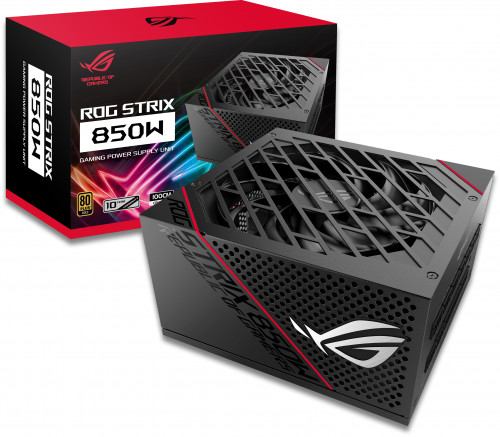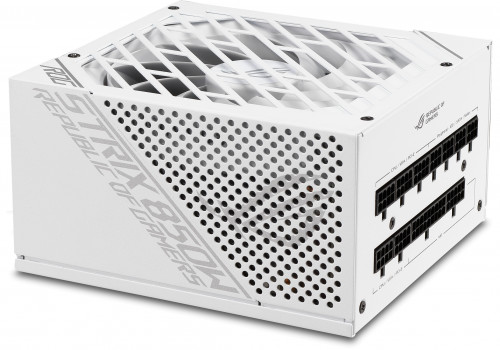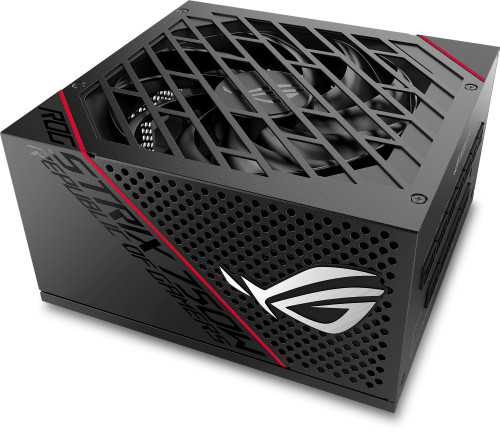ROG STRIX 1000G Black Semi-Fanless Modular 1000W 80Plus Gold PSU Discontinued | |
ROG STRIX 850G White Semi-Fanless Modular 850W 80Plus Gold PSU Discontinued | |
ROG STRIX 750G Black Semi-Fanless Modular 750W 80Plus Gold PSU Discontinued | |
| More variations available Show | |
ASUS ROG STRIX G Series Semi-Fanless Modular 80Plus Gold PSUs
The ROG Strix Series PSUs bring high-end cooling and premium components together for an ultra-quiet high-performance power supply.
Features
- Virtually inaudible ROG thermal solution
- Semi-fanless with 0dB technology
- 80PLUS Gold certification
- Fully Modular cable management
- NVIDIA SLI Ready and AMD CrossFireX
The ASUS ROG Strix Series PSUs feature massive ROG heatsinks and an axial-tech fan design from their premium NVIDIA RTX graphics cards. Below the surface, low RDS (on) MOSFETs and premium Japanese capacitors take on power delivery with ease. The result is an incredibly quiet and efficient power supply with the reserves to handle the most intense power needs.
ROG Heatsinks
The integrated ROG heatsinks have twice the volume than traditional designs, resulting in significantly lower temperatures inside the PSU. This extends the lifespan of components and allows 0dB operation for a longer duration than standard designs. The heatsinks are so effective that fan noise stays whisper quiet, even under full load.
Axial-tech Fan Design
Originally developed for top-end ROG graphics cards, Axial-tech fan design features a smaller fan hub that facilitates longer blades and a barrier ring that increases downward air pressure. For ROG Strix series power supplies, ASUS have scaled that design to 135mm so it keep things cool at low RPMs while producing less noise.
0dB Technology
An onboard controller brings the 135mm fan to a standstill when thermal design power (TDP) is below 40%, letting you enjoy light gaming in relative silence. Above 40% TDP, the fans automatically start up again.
80 Plus Gold Certification
Top-end Japanese capacitors ensure efficient operation and have helped the Strix earn an 80 PLUS Gold certification. The increased efficiency also results in less heat, reducing noise and increasing reliability.
Fully Modular Cables
Each model comes with fully modular 24-pin, 6+2-pin PCI-e, and 8-pin CPU cables that have embedded capacitors to reduce voltage ripple. The cables supplied with the power supply match the body colour of the PSU, meaning the white version is supplied it all white cables and connectors. And if you’d like to add more colour to your build, the included CableMod coupon will set you on your way towards next-level customisation.
10-year Warranty
ASUS are so confident about the reliability of their ROG Strix Series PSUs that they have back them with a 10-year warranty.
| Specifications | ROG STRIX 1000G | ROG STRIX 750G | ROG STRIX 850G Wh |
|---|---|---|---|
| Model | ROG-STRIX-1000G | ROG-STRIX-750G | ROG-STRIX-850G |
| Power | 1000W | 750W | 850W |
| Modular | Fully | Fully | Fully |
| Cable Colour | Black | Black | White |
| Form Factor | ATX | ATX | ATX |
| 80PLUS Certification | Gold | Gold | Gold |
| +3.3V maximum output current | 25 A | 20 A | 20 A |
| +5V maximum output current | 25 A | 20 A | 20 A |
| +12V maximum output current | 83 A | 60 A | 70 A |
| Voltage | 100–240Vac | 100–240Vac | 100–240Vac |
| Frequency | 50–60Hz | 50–60Hz | 50–60Hz |
| Form factor ATX 12V | Version 2.4 | Version 2.4 | Version 2.4 |
| Dimensions (LxWxH) | 160 x 150 x 86mm | 160 x 150 x 86mm | 160 x 150 x 86mm |
| Cooling | Semi-fanless | Semi-fanless | Semi-fanless |
| Noise Level at 40% load or lower | 0 dBA | 0 dBA | 0 dBA |
| Noise Level (50% load) | 10.6 dBA | 10.6 dBA | 10.6 dBA |
| Noise Level (max) | 25 dBA | 25 dBA | 25 dBA |
| Active PFC | Yes | Yes | Yes |
| Protection | OPP/OVP/SCP/OCP/OTP | OPP/OVP/SCP/OCP/OTP | OPP/OVP/SCP/OCP/OTP |
| Safety Certification | CE, CB, TUV, FCC, CCC, ROHS, EAC | CE, CB, TUV, FCC, CCC, ROHS, EAC | CE, CB, TUV, FCC, CCC, ROHS, EAC |
| Energy Star | 6.1 | 6.1 | 6.1 |
| ErP2013 ready | Yes | Yes | Yes |
| ATX-Mainboard (20+4-pin) | Yes | Yes | Yes |
| PCI-Express (6+2-pin) | 6 | 4 | 6 |
| P8-/P4+4 Connector | 0/2 | 0/2 | 0/2 |
| SATA Connectors | 8 | 8 | 8 |
| Molex Connectors | 6 | 3 | 6 |
| Floppy Connectors | 0 | 0 | 0 |
| Warranty | 120 months | 120 months | 120 months |
| EAN barcode | 4718017845571 | 4718017375917 | 4718017646086 |
| Specifications | ROG STRIX 1000G | ROG STRIX 750G | ROG STRIX 850G Wh |
|---|---|---|---|
| Model | ROG-STRIX-1000G | ROG-STRIX-750G | ROG-STRIX-850G |
| Power | 1000W | 750W | 850W |
| Modular | Fully | ||
| Cable Colour | Black | White | |
| Form Factor | ATX | ||
| 80PLUS Certification | Gold | ||
| +3.3V maximum output current | 25 A | 20 A | |
| +5V maximum output current | 25 A | 20 A | |
| +12V maximum output current | 83 A | 60 A | 70 A |
| Voltage | 100–240Vac | ||
| Frequency | 50–60Hz | ||
| Form factor ATX 12V | Version 2.4 | ||
| Dimensions (LxWxH) | 160 x 150 x 86mm | ||
| Cooling | Semi-fanless | ||
| Noise Level at 40% load or lower | 0 dBA | ||
| Noise Level (50% load) | 10.6 dBA | ||
| Noise Level (max) | 25 dBA | ||
| Active PFC | Yes | ||
| Protection | OPP/OVP/SCP/OCP/OTP | ||
| Safety Certification | CE, CB, TUV, FCC, CCC, ROHS, EAC | ||
| Energy Star | 6.1 | ||
| ErP2013 ready | Yes | ||
| ATX-Mainboard (20+4-pin) | Yes | ||
| PCI-Express (6+2-pin) | 6 | 4 | 6 |
| P8-/P4+4 Connector | 0/2 | ||
| SATA Connectors | 8 | ||
| Molex Connectors | 6 | 3 | 6 |
| Floppy Connectors | 0 | ||
| Warranty | 120 months | ||
| EAN barcode | 4718017845571 | 4718017375917 | 4718017646086 |
Product Resources
FAQ
Do high wattage power supplies cost more to run?
No - the rated wattage of a power supply refers to the maximum amount of power it can deliver at full load, not how much power it uses. More powerful PSUs will consume around the same amount of power as lower powered power supplies in any given PC system, so your electricity bill will not be higher when using a more powerful power supply!
The best way to reduce your electricity bill when using your PC is to use a more efficient power supply or make your PC consume less power by removing components which are not needed, such as extra drives and expansion cards, or by choosing a cooler-running processor or graphics card.
My brand new power supply doesn’t work! Am I doing something wrong?
It’s possible that the power supply may be faulty, but here are some simple things to check. Firstly, a power supply will not work if you simply plug it in and flick the switch. The power supply will only turn on if you connect it to a working motherboard and associated items (processor, memory, video card, etc). It is actually the motherboard which tells the power supply when to switch on.
Secondly (if applicable), check the voltage is set correctly to 115/230 volts depending on what country you are in. Thirdly, if possible it would be good to try the power supply in another PC to see if it works, or try another power supply in your PC to see if that works. You can then tell whether it is the power supply which is faulty or the actual PC itself. If all else fails, please contact us for further support, and/or return details.
Why should I buy a whole new PSU when I could just replace the noisy fan in my existing one?
Virtually all the noise generated by a PC power supply originates from the cooling fan inside it, so simply replacing the fan with a quiet fan may seem an obvious way to go. However, if you are thinking about attempting this operation, please bear the following points in mind:
- Your existing power supply will be designed to run with a specific amount of airflow in order to adequately cool the components inside and reducing the airflow may lead to overheating and damage to the power supply and/or PC.
- All PC power supplies contain very high voltages and even with the power disconnected, the voltages stored in the capacitors can be easily enough to kill. It is not recommended to take the cover off any PC power supply for this reason unless you are absolutely confident of your own ability. Because of the grave dangers involved, all PC power supplies by law carry a warning label forbidding removal of the power supply case.
- There will be no standard PC fan connector inside the power supply to use to connect a replacement fan, and it would probably have to be soldered directly into the PCB inside the power supply, or have a specialist power connector attached. This can be a tricky operation to say the least.
Please consider the above points very carefully before proceeding with an operation to replace the fan in your existing power supply!
What is PFC (Power Factor Correction)?
If you are interested in being “green” and saving the planet, you might like to read a short explanation of how our power supplies can save energy using Active PFC (Power Factor Correction), not to be confused with Power Conversion Efficiency which is also very good in most of our PSUs. “Power Factor” is a measure of how efficiently electrical power is consumed. Ideally, Power Factor would be 1 (or 100%) and known as unity.
Unfortunately in the real world, Power Factor is reduced by highly inductive loads down to values of 0.7 (70%) or less. This induction is caused by equipment such as small electric motors, fans, fluorescent lighting ballasts and transformers such as those in PSUs. This is bad news for the electricity generating companies who can impose a surcharge on heavy users if they have a consistently low Power Factor, as more electricity has to be produced to make up the shortfall.
Power Factor Correction (PFC) is used in some equipment to minimise the inductive component of the electrical current. This helps to reduce the losses in the electrical supply to that equipment. Power Factor Correction capacitors are normally used to reduce induction in an electrical load, which minimises wasted energy and hence improves the efficiency of a company and reduces electricity costs.
It is not usually practical to reach unity, i.e. Power Factor 1, and it seems that most electricity supply companies accept consumers having a Power Factor as low as 0.94 (94%) without imposing a surcharge. Unfortunately most of the cheap (and not so cheerful) PSUs tend to have a Passive PF as low as 0.75 or 75% which in a large office can lead to a PF surcharge.
However, the good news is that most of Quiet PC’s PSUs implement a system known as Active PFC which involves some clever electronics. This means that their power factor (PF) can be as high as 0.94 or 94% (at full load), while harmful harmonic frequencies are reduced to well below legal requirements. So by using our products, you can be happy in the knowledge that you are doing your bit to save the planet!
How do I know what size of wattage power supply I need?
The best answer we can give to this question is to go ahead and take an intelligent “guesstimate”! There are no hard and fast rules about what size of power supply any given PC needs as a minimum. Our advice would be that if you are replacing an existing power supply, then consider a new one at least of the same wattage as the old one. In addition, if you wish to build in a “safety margin” to allow for reliable running and possible future upgrades, consider adding 100-200 watts to the rating of your existing unit.
If you are building a new PC, most customers now buy a power supply rated in the region of 500-800 watts depending primarily on the performance level of their graphics card(s) and number of drives to be installed. But in any event if you are unsure about which power supply would be best for your PC then please do contact us by phone or email and we will be happy to give you a specific recommendation based on your budget.
My new PSU came with a 24-pin connector but my motherboard needs 20 pins! Do I need an adaptor cable?
We receive many customer enquiries about this. In fact, most of the 24-pin compatible power supplies we sell come with special motherboard connectors which can be converted to 20-pins with no additional conversion cables. All you need to do is look carefully at the connector and you will see that the end four pins can be slid off, turning the connector into a 20-pin compatible one (see below) - easy when you know how!
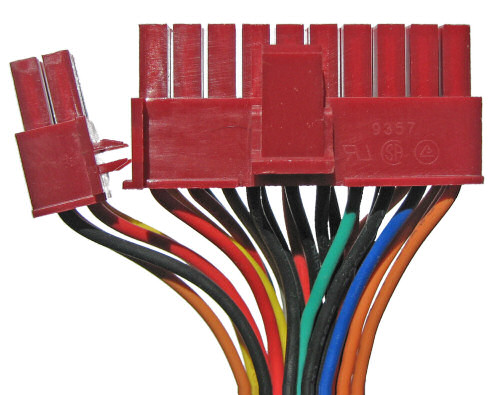
Image showing how to change a power supply’s 24-pin motherboard connector into a 20-pin connector by unclipping the end four-pin blockWhat do the PSU safety protection abbreviations mean?
There are many possible safety protections a PSU can have. Below is a list of what each abbreviation means. Please note, not all PSUs have all safety protections.
- OCP - Over-Current Protection
- OVP - Over Voltage Protection
- UVP - Under Voltage Protection
- SCP - Short Circuit Protection
- OPP - Over Power Protection
- OTP - Over Temperature Protection
- UL - Underwriters Laboratories, more information.
- TÜV - Technical Inspection Association, more information.
- CE - European Conformity, more information.
- FCC - Federal Communications Commission, more information.
- RoHS - Restriction of Hazardous Substances Directive, more information.
- WEE - Electronic waste, more information.
- 80 PLUS - Promotes energy efficiency for PC power supplies, more information.
- ErP - Energy Related Products, more information.
More information on certification marks can be found here.
Top Quiet Power Supplies
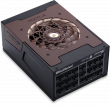
Seasonic PRIME TX-1600 Noctua Edition 1600W 80Plus Titanium Semi-Fanless PSU

Seasonic PRIME Fanless 500W 80PLUS Platinum Modular Power Supply

Streacom ST-NANO160 160W nanoPSU and AC/DC adapter block

Streacom ST-ZF240 ZeroFlex 240W Passive PSU

Seasonic PRIME Fanless 700W 80PLUS Titanium Modular Power Supply

be quiet Pure Power 11 400W Quiet PSU 80PLUS Gold

FSP Hydro Ti Pro 1000W 80PLUS Titanium Fully Modular ATX 3.0 PSU

be quiet Pure Power 12 M 750W 80+ Gold Fully Modular ATX3.0 PSU
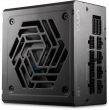
FSP VITA GM 750W 80PLUS Gold Fully Modular ATX 3.1 PSU

be quiet Pure Power 12 M 1000W 80+ Gold Fully Modular ATX3.0 PSU

